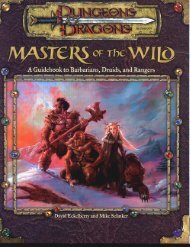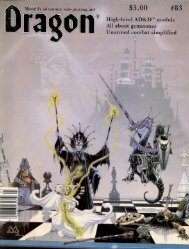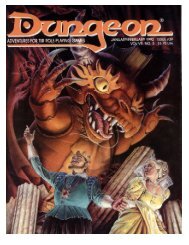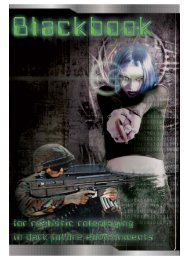Accessory - Dragon Magazine #111.pdf - Index of
Accessory - Dragon Magazine #111.pdf - Index of
Accessory - Dragon Magazine #111.pdf - Index of
You also want an ePaper? Increase the reach of your titles
YUMPU automatically turns print PDFs into web optimized ePapers that Google loves.
No campaign ever fails<br />
What to do if your game gets out <strong>of</strong> control<br />
by Joel E. Roosa<br />
Valandar, Lord <strong>of</strong> Eldor, General <strong>of</strong><br />
Generals, and 23rd-level fighter, pulled on<br />
his shimmering, golden plate mail +6. He<br />
buckled his girdle <strong>of</strong> titan strength about his<br />
waist and hefted his sword <strong>of</strong> disintegration<br />
+6. Then he surveyed himself in his mirror<br />
<strong>of</strong> healthful reflection and deemed himself<br />
fit to battle the dragon that had been ravaging<br />
the countryside.<br />
In another universe, Gelkin, a 4th-level<br />
fighter, put on his chain mail +3, unsheathed<br />
his longsword +1, and lifted his<br />
shield +2. He woefully thought <strong>of</strong> the few<br />
gold pieces remaining in his pouch and<br />
hoped to find an adventure that might pay<br />
enough to live on for a while.<br />
The preceding paragraphs give examples<br />
from hypothetical campaigns, one wellbalanced<br />
and one “Monty Haulish.” Which<br />
is which may not be obvious.<br />
Valandar was run for nine years <strong>of</strong> real<br />
time, gained two to three levels per year,<br />
and undertook extremely dangerous quests.<br />
He has an impressive array <strong>of</strong> equipment,<br />
but none <strong>of</strong> it has ever made any adventure<br />
a cake-walk.<br />
But Gelkin got all his equipment and<br />
levels during one adventure.<br />
To further illustrate, we visit Valandar<br />
and Gelkin a few hours later.<br />
Valandar, Lord <strong>of</strong> Eldor, limped into his<br />
chambers, his battered and bloody armor<br />
squeaking as he moved. In his right hand he<br />
held the useless stub <strong>of</strong> his former sword,<br />
which still steamed from the dragon’s blood.<br />
With a curse on the corrosive fluids in a<br />
dragon’s body, he cast the sword fragment<br />
away. Perhaps it could be made into an<br />
enchanted nail file for his wife.<br />
He gazed forlornly at his blackened waist,<br />
where his girdle <strong>of</strong> titan strength once hung.<br />
“ Under the armor, under the armor!” he<br />
shouted. “Wear magic belts under the<br />
armor!”<br />
He peered into his mirror <strong>of</strong> healthful<br />
reflection and immediately felt his wounds<br />
begin to heal. His armor wasn’t so lucky.<br />
Perhaps the master smiths could repair it —<br />
but perhaps not.<br />
Meanwhile, Gelkin, slayer <strong>of</strong> goblins,<br />
surveyed his handiwork. Three dead orcs<br />
and an open chest lay before him. He was<br />
now 5th level and had enough gold for<br />
months. Gelkin pulled his newfound sword<br />
from its scabbard and learned that it was a<br />
vorpal weapon +5 and also had the abilities<br />
<strong>of</strong> a staff <strong>of</strong> the magi. “Neat,” he said.<br />
Campaigns cannot be neatly categorized<br />
on the basis <strong>of</strong> a few examples from them.<br />
22 JULY 1986<br />
After getting the definition <strong>of</strong> some terms<br />
out <strong>of</strong> the way, this article will examine the<br />
problems that crop up in many campaigns<br />
and how to deal with them.<br />
A “campaign,” in the fantasy roleplaying<br />
sense, is a series <strong>of</strong> adventures with<br />
an overall connection. It usually involves<br />
either recurring groups <strong>of</strong> characters, settings<br />
in the same world (or related worlds),<br />
or both.<br />
A properly run campaign is usually called<br />
“balanced.” A poorly run campaign is<br />
called “unbalanced.” I prefer the terms<br />
“controlled” and “uncontrolled,” respectively.<br />
Often, when a campaign has become<br />
uncontrolled for a long period <strong>of</strong> time, it is<br />
called a failure.<br />
Individual adventures can indeed be<br />
failures, but as a whole, no campaign ever<br />
fails, and any campaign can be controlled.<br />
Recognizing uncontrolled campaigns<br />
Most articles about “failed” or “Monty<br />
Haul” campaigns warn about the dangers<br />
<strong>of</strong> overly powerful characters upsetting the<br />
“game balance.” Game balance is a relative<br />
term. Over-powerful characters from one<br />
game may be under-powered in another.<br />
Obviously, a campaign in which players<br />
use gods <strong>of</strong> the Egyptian pantheon as player<br />
characters is in a different class from one in<br />
which all player characters are halflings. If<br />
Ra were to enter the halfling campaign, the<br />
halfling players might consider him to be<br />
from an uncontrolled campaign, They<br />
might be right, but a given campaign must<br />
be judged separately from other campaigns.<br />
Game balance therefore depends on the<br />
internal workings <strong>of</strong> each individual campaign.<br />
To determine if a campaign is out <strong>of</strong><br />
control, evaluate the following:<br />
1. Have most <strong>of</strong> the characters achieved<br />
their levels fairly without undue “favors <strong>of</strong><br />
the gods,” and through real danger to the<br />
characters? “Fairly” can even mean starting<br />
all characters at 2nd level or higher, as<br />
long as all characters have the same chance<br />
(although I prefer that all characters start at<br />
1st level). “Favors <strong>of</strong> the gods” can include<br />
wishes that raise levels, decks <strong>of</strong> many<br />
things, and various magical tomes. Experience<br />
gained without risk is a gift. In one<br />
adventure, the DM granted my party full<br />
experience points for burning to death three<br />
defenseless treants. Gaining a level per<br />
adventure, or even per two to six adventures,<br />
is too fast.<br />
2. Has magical or technological equip-<br />
ment been mostly earned by real effort?<br />
Gaining a magical sword by chopping a tree<br />
down with a herring might count as real<br />
effort. Freeing a sword from a block <strong>of</strong> ice<br />
with a blowtorch probably wouldn’t. Of<br />
course, if the herring were highly enchanted,<br />
or the character has to invent the<br />
blowtorch, it might be different. Magical<br />
items lying unguarded behind normal secret<br />
doors take no great effort to acquire; ones<br />
behind trapped secret panels with special<br />
opening codes would.<br />
3. Do most <strong>of</strong> the characters find the<br />
greater share <strong>of</strong> the individual adventures<br />
challenging? By “challenging” I don’t<br />
mean vaporizing Lolth as an appetizer,<br />
destroying Demogorgon for the main<br />
course, and annihilating Yeenoghu for<br />
dessert. By “challenging” I don’t mean a<br />
crippled goblin killing three out <strong>of</strong> six characters.<br />
By “challenging” I mean an adventure<br />
that makes the characters exert their<br />
abilities to a great degree, makes them<br />
worry about survival, and gives some <strong>of</strong><br />
them wounds to remember. An adventure<br />
doesn’t have to kill any characters to be<br />
challenging. My adventures kill characters<br />
rarely, maybe once every twenty adventures<br />
or less. Challenges can also be mental —<br />
puzzles to solve, traps to figure out, amd so<br />
forth.<br />
4. Most importantly: Is most everyone<br />
having fun? This includes the DM as well<br />
as players. Not all players enjoy a particular<br />
DM’s style, and vice versa. Not everyone in<br />
a group will always care for the particular<br />
adventure they’re on. Some players like<br />
certain types <strong>of</strong> adventures and prefer DMs<br />
who oblige them. Some prefer hack-andslash,<br />
some like “thinking” adventures,<br />
some like very controlled, narrow-purpose<br />
adventures, and some just like to roam and<br />
have random encounters. The different<br />
types <strong>of</strong> players are not necessarily incompatible.<br />
One player’s favorite saying was<br />
“wake me when the fighting starts.” He<br />
wasn’t the least interested in solving riddles<br />
or bargaining with merchants; he let the<br />
others do that. His character fought and he<br />
was happy. On the other hand, another<br />
player preferred to leave the fighting to<br />
others while he lived by his wits.<br />
Each “yes” answer to the above questions<br />
is worth 1 point, each “no” worth 0.<br />
Total the points and continue with the following<br />
section.<br />
5. Are any characters too powerful?<br />
Power is a relative term. An 8th-level







